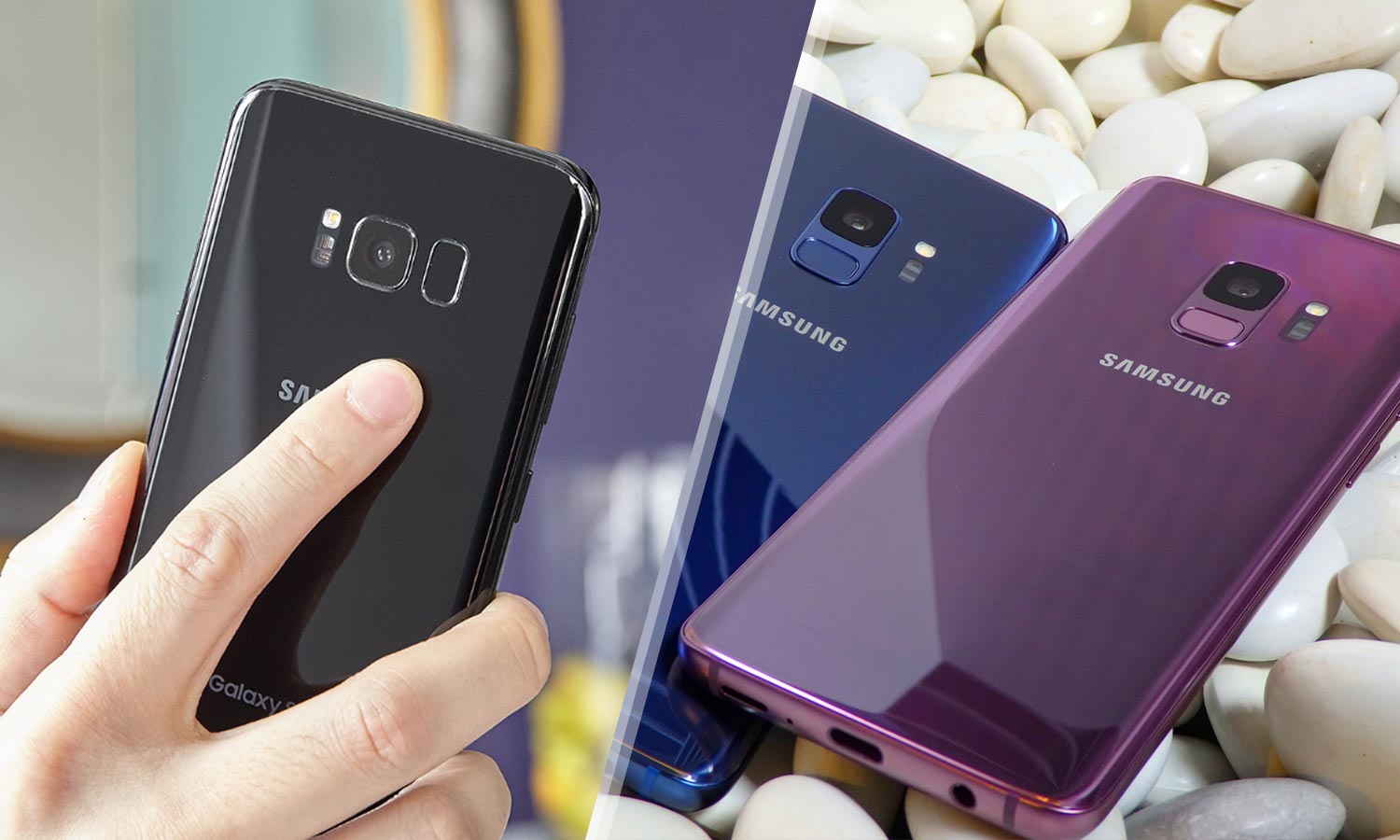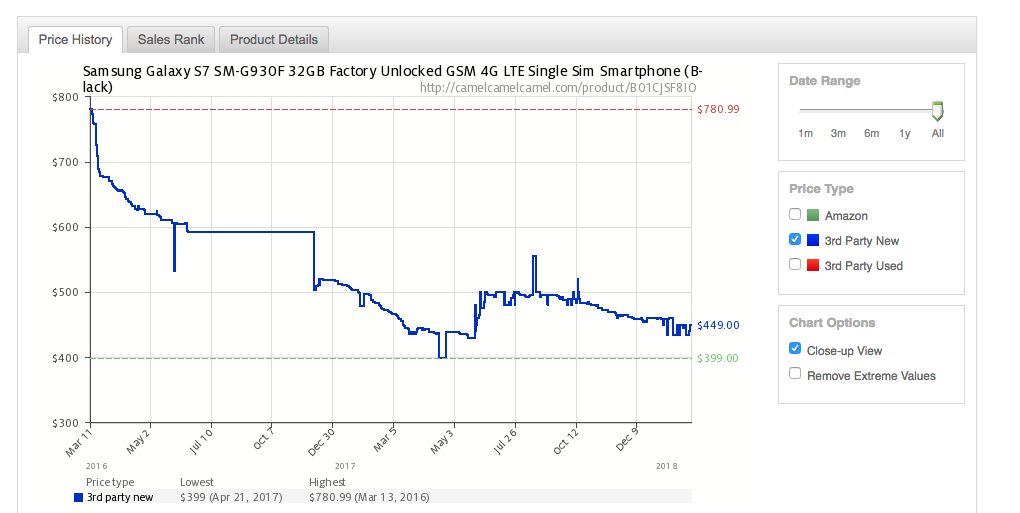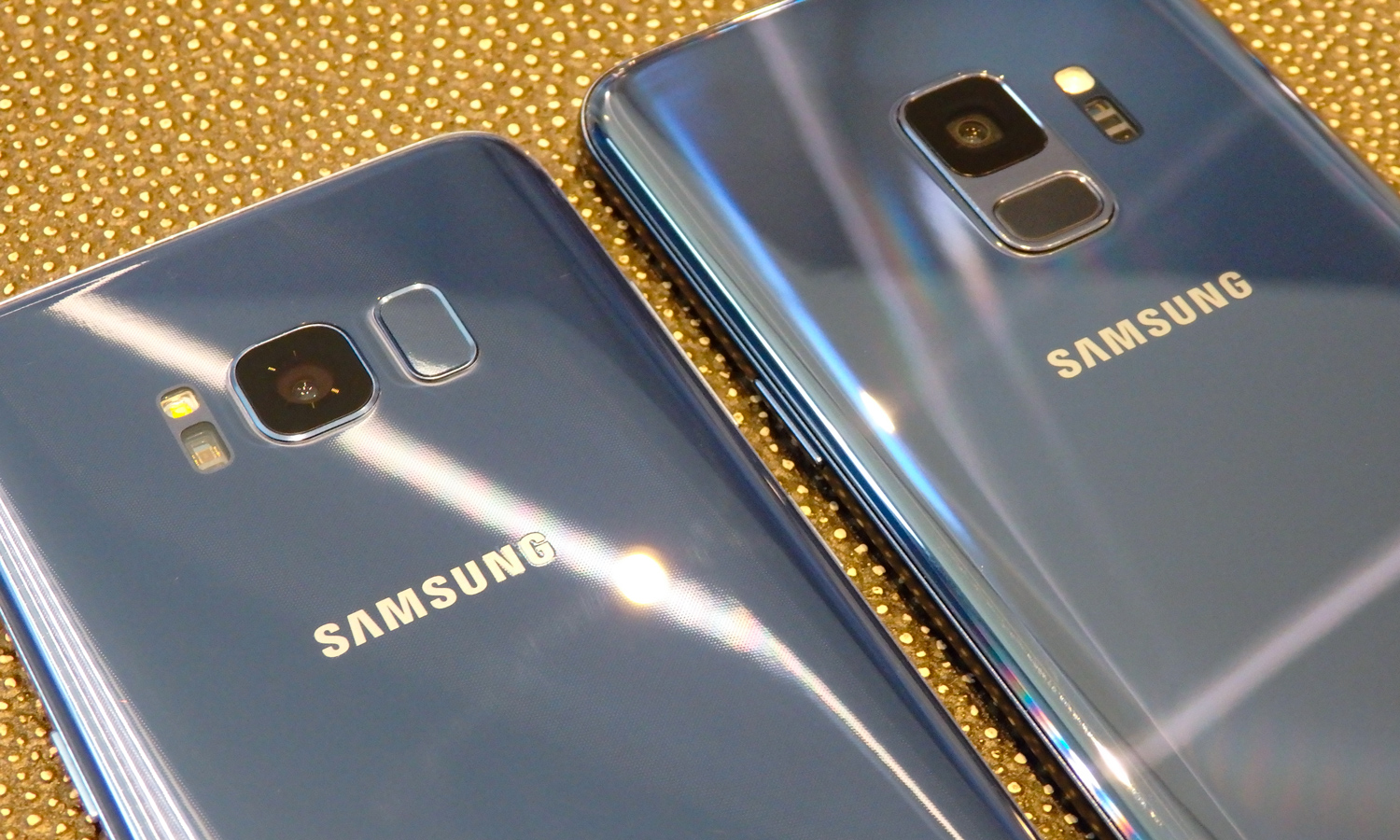Galaxy S9 vs. Galaxy S8: Go New or Save Money?
The arrival of the Galaxy S9 eventually will make the Galaxy S8 a bargain hunter's dream, if the price falls as it has for past phone launches.

Now that Samsung has unveiled its latest smartphone, the Galaxy S9 promises more advanced cameras, a more powerful and efficient processor... and quite the price tag depending on where you buy the phone. While Samsung’s price for the S9 is actually a little bit less than what the S8’s debut price, some carriers are charging nearly $800 for the new phone, with the S9+ commanding more than $900 at some locations.
You don't necessarily have to resign yourself to spending a huge chunk of cash just to get a high-end flagship phone. There's a perfectly powerful smartphone on the market right now, and it's likely to see a big price cut in the coming weeks.
That would be the Galaxy S8, the model that the upcoming S9 is looking to brush aside.
MORE: Galaxy S9 vs. Galaxy S8: What’s Changed
It may seem counterproductive to spring for last year's phone when the S9 promises improved specs, particularly when it comes to the device's cameras. But the S8 is a pretty formidable phone in its own right, as it was our top-ranked smartphone for most of 2017. And you'll soon be able to buy one for a lot less than you would have had to pay just a few weeks ago, with prices already dropping at some retailers.
Here's a closer look at what you can expect to save should you opt for a Galaxy S8 over a newer S9, along with what you're potentially giving up in exchange for a lower price tag.
Galaxy S8 Pricing: Going Down
No one can say with any certainty just how much the Galaxy S8’s price is going to drop now that pre-orders will start for the S9 on Friday (March 2). But if past pricing for previous product launches is any indicator, that S8 price could be slashed in a hurry.
Sign up to get the BEST of Tom's Guide direct to your inbox.
Get instant access to breaking news, the hottest reviews, great deals and helpful tips.
In general, phone prices tend to drop by 15 percent over 12 months.
That's what happened a year ago when the Galaxy S8 debuted, and the Galaxy S7 suddenly became less of a hot commodity, according to Lindsay Sakraida, director of content marketing with deal discovery service DealNews. "Last year, after the S8 was announced, we found deals on the unlocked 32G S7 for as low as $380, which was $370 off list price," Sakraida told Tom's Guide when we spoke to her prior to the S9’s debut. "We also saw the 128GB version for $570. So before the [S8] was available in stores, we only saw discounts on the unlocked S7."
That changed once the S8 launched in April 2017. By then, Sakraida added, wireless carriers were cutting the monthly payment for S7s bought on installment plans. The S7, which had a debut price of $670, fell to about $575 to $600 in the months after the S8's release, according to DealNews' figures. These days, you can find the S7 available for $449 on Amazon.
Price-tracking site CamelCamelCamel backs up that data, showing the price on the Galaxy S7 from third-party sellers taking a noticeable dip (see below) in the spring of 2017, as the S8 hit the market. Prices for even older models like the Galaxy S6 follow a similar trend.

In general, phone prices tend to drop by 15 percent over 12 months, said Christine Gallup, associate editor at cellphone comparison site Whistleout.
The S7's price drop when the S8 came out may have been something of an outlier, DealNews' Sakraida warned. "The S7 was a fine phone, but for many shoppers, it was mired a bit by the Note 7 fiasco, so it's possible the S7 was more aggressively discounted than the S8 will be when the S9 is announced," she added.
Still, look for discounts on the unlocked S8 in the aftermath of the S9's announcement, according to Sakraida, with lower monthly payments on the older phone coming from carriers once the S9 starts shipping.
As of this writing, both Samsung and major wireless carriers are still charging more than $700 for the Galaxy S8, though that’s likely to change once the S9 goes on sale. It’s a different story at retail websites, where some unlocked versions of the S8 now sell for less than $650. Certified refurbished phones can be had at even lower prices. And again, this is before pre-orders have even begun on Samsung’s newer phone.
What You're Giving Up
So you're getting a less expensive phone if you opt for the Galaxy S8 over the newer S9 — currently $100 cheaper and likely to drop further. What features are you sacrificing in the name of lower costs?

The biggest enhancements in the Galaxy S9 focus on photography. The new phone features a 12-megapixel rear shooter with an adjustable aperture: in low-light settings, the aperture will widen to f/1.5, while it can also narrow to f/2.4 to capture more detail on wide-angle shots. The S9 still sports a single rear camera like the S8 and S8+, while dual lenses now feature on the larger (and more expensive) Galaxy S9+.
MORE: Galaxy S9 Super Guide: Everything You Need to Know
We’ve had the chance to take some initial test shots with the S9 — we’re still working on in-depth head-to-head comparisons with other phones, but these pictures give us the chance to get a sense of how the S9’s upgraded camera performs. Generally, we noticed better performance in lower light, though color accuracy isn’t as strong in some situations.
"I definitely think people should consider the S8 once the S9 becomes available, especially since the carriers will offer price deals." — Christine Gallup, WhistleOut
The Galaxy S9 is also powered by the new Snapdragon 845 mobile processing platform from Qualcomm. We've benchmarked the Snapdragon 845, which will definitely offer more oomph than the Snapdragon 835 inside the Galaxy S8. It also scores better on graphics tests, and — perhaps most important — it's more energy-efficient, which will help the S9 improve upon the S8's battery life. But we still need to complete tests with the S9 itself to confirm just how big a boost you’re getting.

Finally, the Galaxy S9 runs the latest version of Android. While Android Oreo has been available since last fall, it still hasn't found its way to the Galaxy S8, with Samsung reportedly pulling a beta of the update planned for its flagships.
But with the S9 adapting the look of the Galaxy S8 right down to its extra-wide Infinity Display, is that enough to pay up for the new phone? When we spoke to Whistleout's Gallup before the S9's unveiling when most of the changes had already leaked out, she wasn't so sure.
"I definitely think people should consider the S8 once the S9 becomes available, especially since the carriers will offer price deals, and there doesn't seem to be much difference between the two models," she said.
While people who want the latest in camera technology may find the S9's changes too irresistible to pass up, the cameras on the S8 still produce quality shots. The iPhone X and Google Pixel 2 outperform the S8 in camera face-offs we've conducted, but that doesn't change the fact that the S8 remains one of the better Android camera phones, even a year after its initial release.
The S9 will undoubtedly outperform the S8 when we get some official test results, not just because of its Snapdragon 845 processor but also because Samsung is packing 6GB of RAM into the S9+. Still, the Snapdragon 835 remains a top-performing processor that can more than handle whatever you throw at it.
Consider also that there's already a healthy accessory market for the Galaxy S8, while there might be some lag before case makers and others can trot out new offerings for Samsung's latest phone. Even the DeX Pad, built by Samsung to turn your phone into a mobile PC, is backward-compatible with older phones like the S8.
Bottom Line
Whether to pass up a new flagship phone in favor of last year's model depends a lot on what features you value. If you rely on your smartphone to capture a lot of pictures, the Galaxy S9's improvements may be worth the extra cost. Also consider how long you're planning on holding on to your next phone. While the S8 can stand up to most apps now, that may not be the case in 18 months, as updated versions of Android arrive and app makers push out more processor-intensive offerings.
Still, based on the specs and features for Samsung's new phone, the S9 isn’t that radical a departure from last year's big update. If you can live without some of the bells and whistles in the Galaxy S9, the current Galaxy S8 should be more than enough phone to meet your needs — especially with price cuts looming.
Editors' Note: This article was originally published Feb. 18. We've updated it with new information now that the Galaxy S9 specs are official.
Philip Michaels is a Managing Editor at Tom's Guide. He's been covering personal technology since 1999 and was in the building when Steve Jobs showed off the iPhone for the first time. He's been evaluating smartphones since that first iPhone debuted in 2007, and he's been following phone carriers and smartphone plans since 2015. He has strong opinions about Apple, the Oakland Athletics, old movies and proper butchery techniques. Follow him at @PhilipMichaels.
-
Edward Marineves Y'know, phones have already reached a level of performance where even a cheap phone basically does everything I need. I used to chase the top phones, and their upgrade cycle, but my current phone is an Amazon-themed Motorola G4 that I got for...what, $100? Pictures are fine, there's not an app I can't run, and I just flat out never worry that I'm gonna drop it and break it, or leave it in a cab, or whatever. It's a $100 phone! To buy a $1,000 phone that does a few things better seems insane to me. Does anyone really need face recognition? I can't push a button? For $900, I'll push a button.Reply -
michaeld.vbg.coo Hi Ed - you're right, for you. I have had many situations where, enroute to a meeting somewhere, I had to edit content on a Powerpoint, Excel or Word document, then e-mail that newly updated item to the caller - who is still on the phone. That is 3 simultaneous sessions activating various parts of the phone I use. I can't afford the risks of dropped calls, phones that choke in the middle of document edits or are too consumed or busy to fire something out. It has to be able to perform under all these scenarios. Are all my days like that - no, but 3-4X a week I am in that situation. I buy for the busiest, worst case scenarios I have failed in before due to hardware bought that was not to spec, despite all the slick marketing. I invest against failures, not to the most reasonable option.Reply
That said, I make recommendations to others regarding usage parameters, inclusive of worst case scenarios. Sometimes, they forgot to tell me things they had experienced, so they have a phone that might handle that anomalie under ideal conditions, but not always, under any condition. And you're right - price points for certain capabilities are always evolving, usually downward. My biggest challenge is keeping up with it, and reading early adopters' experiences with that specific device. That usually informs me best vs. the marketing pieces.
M -
dokeefe1986 Is Bixby still going to be shoved down our throats? If so, I can wait until they learn.Reply -
wabbees This article fails to address the most important feature set, security. Security is becoming more important and a differentiator between new models. The most important security element to me is the phone's access to monthly (at least) security updates. Will Samsung's new phone include direct OTA security updates, or require that retailing carriers to do it at a certain guaranteed frequency? For how long? By even writing about such features, manufacturers will have more reason to pay attention to them.Reply

